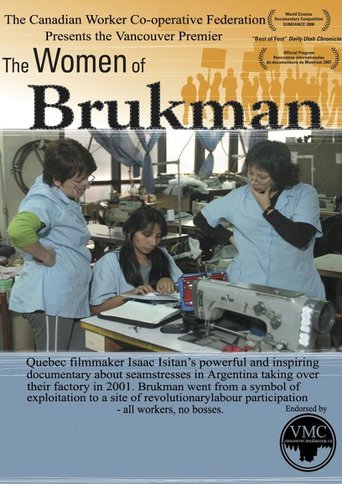

I recently read that Forbes magazine named Salt Lake City the #1 city in America for jobs. Apparently, we have an abundance of well-paying jobs in a variety of fields, particularly in tech-based industries. Honestly, besides a few cities that suffer from unemployment, is there any country that offers more opportunity for a decent way of life than The U.S.? Yet somehow, many U.S. citizens still find a way to grumble and wallow in self-pity about our job market.The gripping new documentary "The Women of Brukman" tells the incredible story of a group of die-hard women (and a few men) working for a suit manufacturer in Argentina who are abandoned by their employers. The owners of the Brukman Clothing Company, facing bills, deficits and wages they can't possibly pay, ship all of the management out without mentioning a word to the laborers. In America, these laborers would more than likely walk out too and start scanning the want ads.But in Argentina good work is scarce. These workers take pride in what they do, and have devoted years to the company. Spurred on by devotion to their craft, families and each other, the workers of Brukman decide to keep the factory running themselves, and make a startling discovery: when they are forced to do the books and are privy to just how much money can be made on each suit, they realize that their bosses were skimming off and pocketing quite a chunk of change.The workers form a co-op: everyone does their fair share and gets paid equally. They don't simply stop when their specific duty is fulfilled. They work together to cross-train on all the factory duties to maximize production.When the business shows signs of prospering, the owners come knocking, attempting to seize control. The workers retaliate, stating that the factory was abandoned and that it now belongs to them. Soon the government intervenes. The complex series of crises and struggles the workers of Brukman face is unbelievable, but so is their tenacity.Probably the most amazing part, however, is the spirit that surrounds the workers. These are no sobbing martyrs. These women carry with them a gaiety and happiness that can only be derived out of a communal effort for a worthy cause. What they do gives them a tremendous sense of purpose and why not? Not only do they enjoy putting in a hard day's work, they're getting paid fairly for it.Gee, what a novel concept.The worker's foresight and intelligence about their market belies their plebeian appearances. It's soon apparent that they can run the place better than the big wig investors who started it. They understand what makes good business work: they don't merely cater to department stores, but make goods for government and municipal workers. They understand the need a goods-based industry like theirs has for government cooperation.The film could have easily fallen into a campaign for communism. While it touches on the benefits of a communal government, the film is more concerned with celebrating the respectability of doing hard work, being honest, and making sensible use out of a society's resources. One woman walks past a number of mammoth, abandoned warehouses. Then she comes across one that, like the Brukman place, was put back into operation by desperate workers who refused to give up. These people have great ideas, but face even greater opposition from their bullheaded governments.Director Issac Isitan remarkably captures the entire sequence of conflict on video, from the initial desertion of the factory by the owners to the workers' protest and riots in the streets, to the court battles that the Brukman employees continue to face up to the present day. It's not merely talked about in hindsight, you see everything. This film should be mandatory viewing for any child approaching the legal working age just so they see how valuable a job is to people in struggling countries. One of the most important films I've seen in years.
... View More